2021--2022学年人教版七年级英语下册Units 1-4复习课件(94张PPT)
文档属性
| 名称 | 2021--2022学年人教版七年级英语下册Units 1-4复习课件(94张PPT) | 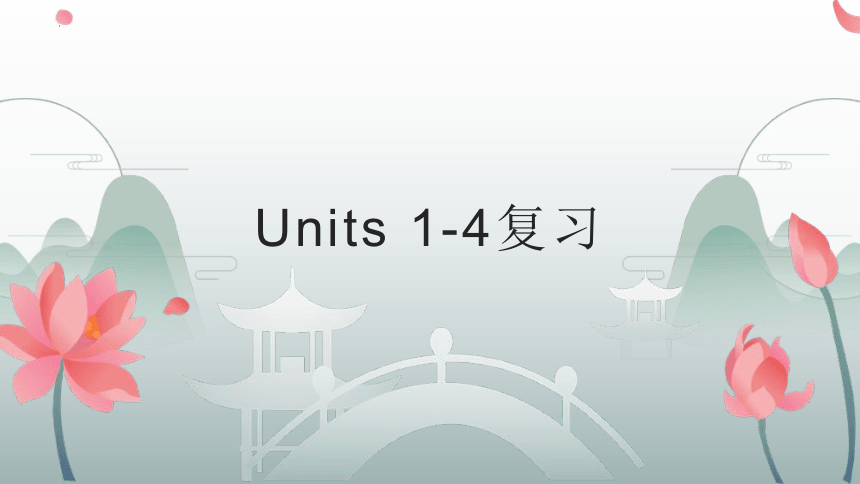 | |
| 格式 | pptx | ||
| 文件大小 | 1020.5KB | ||
| 资源类型 | 教案 | ||
| 版本资源 | 人教新目标(Go for it)版 | ||
| 科目 | 英语 | ||
| 更新时间 | 2022-04-06 21:34:25 | ||
图片预览

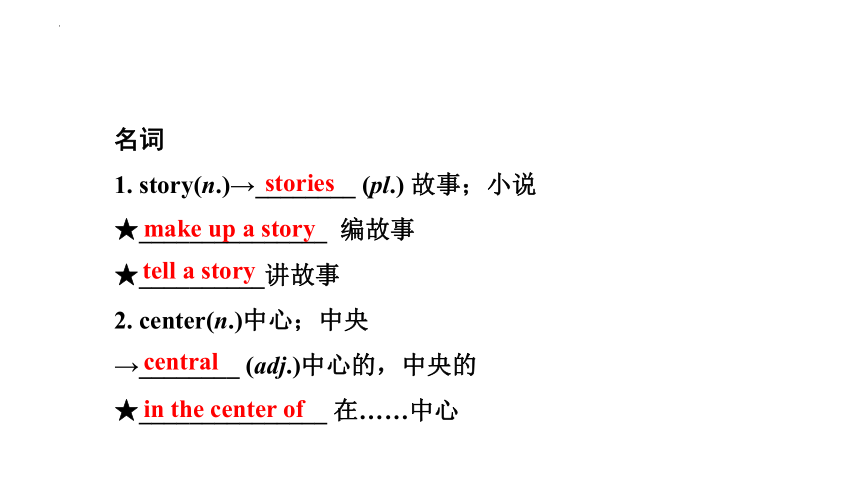
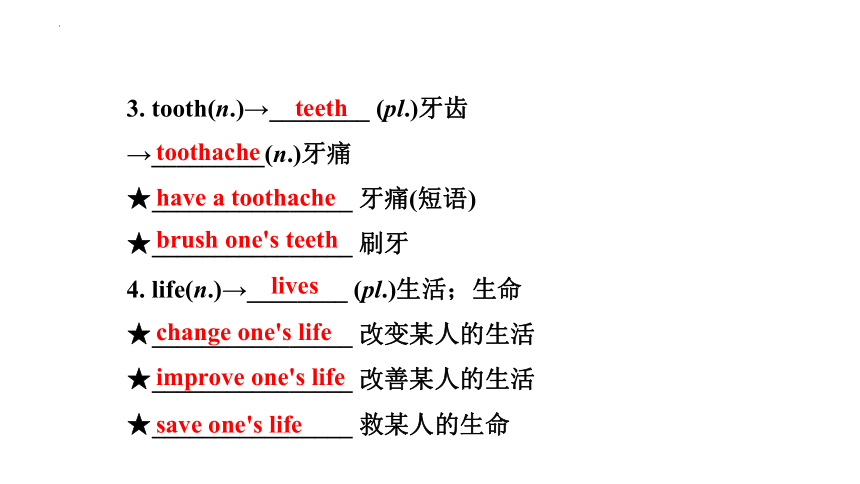
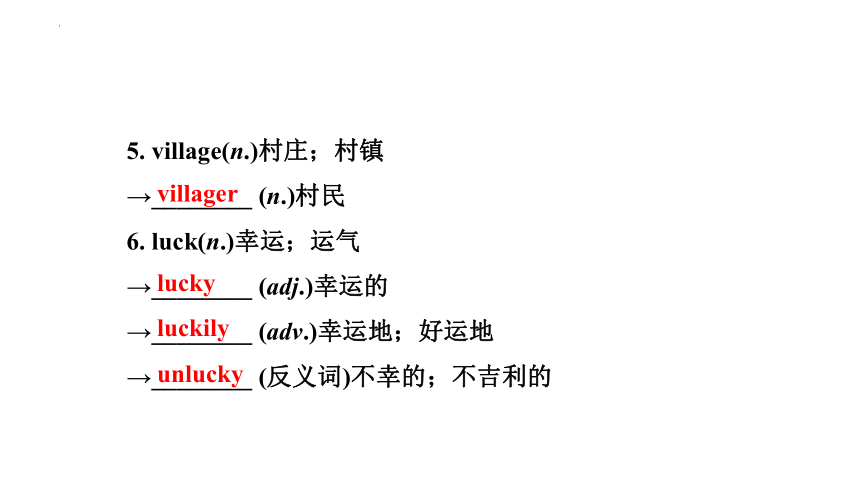
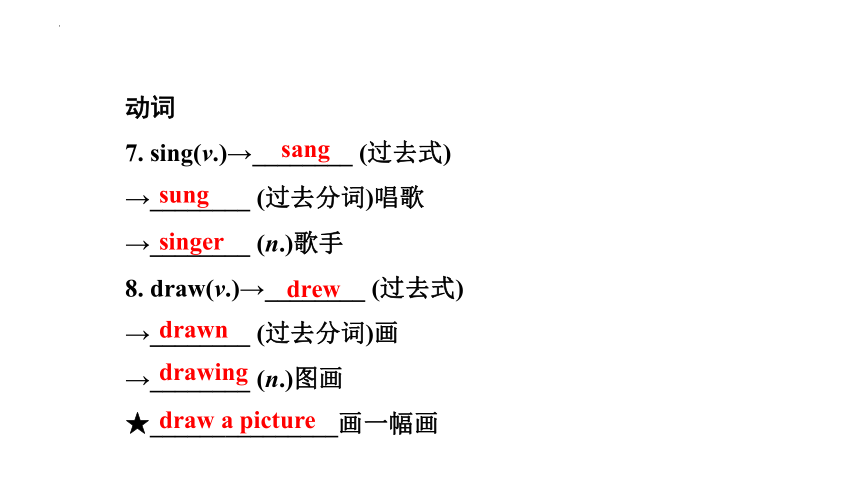
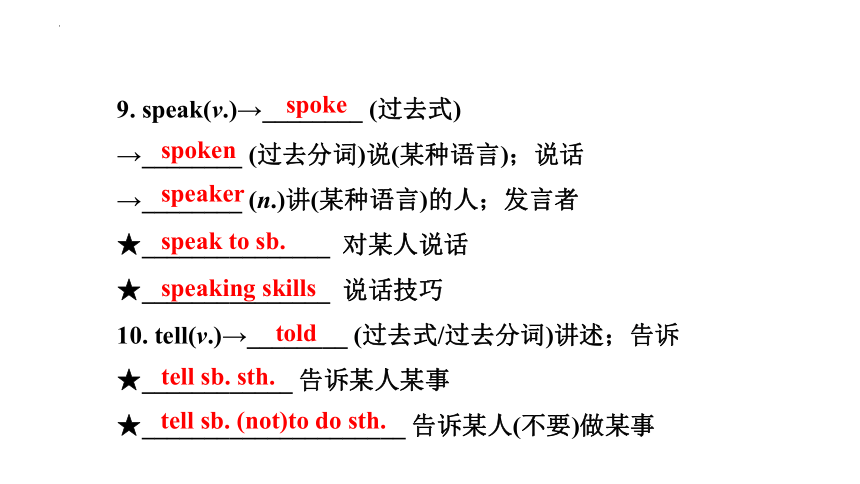
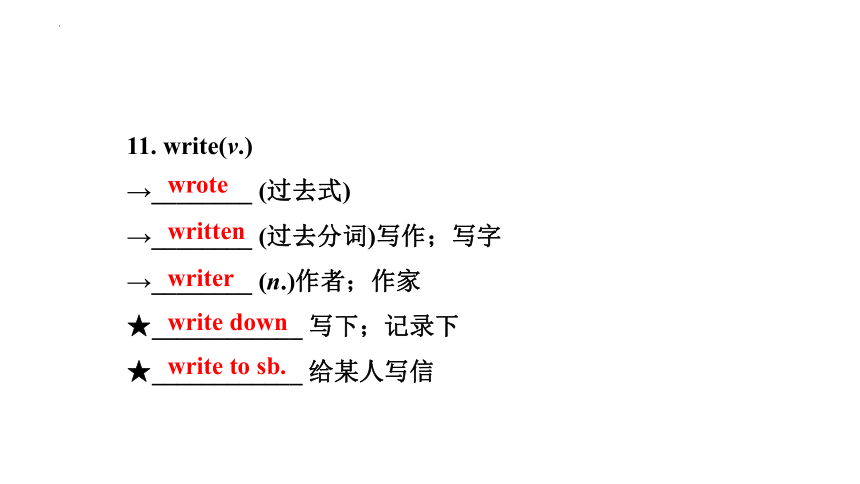
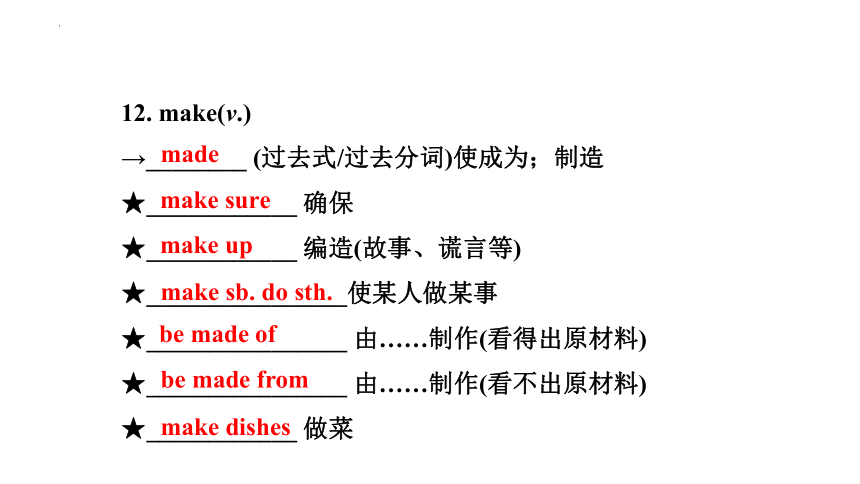
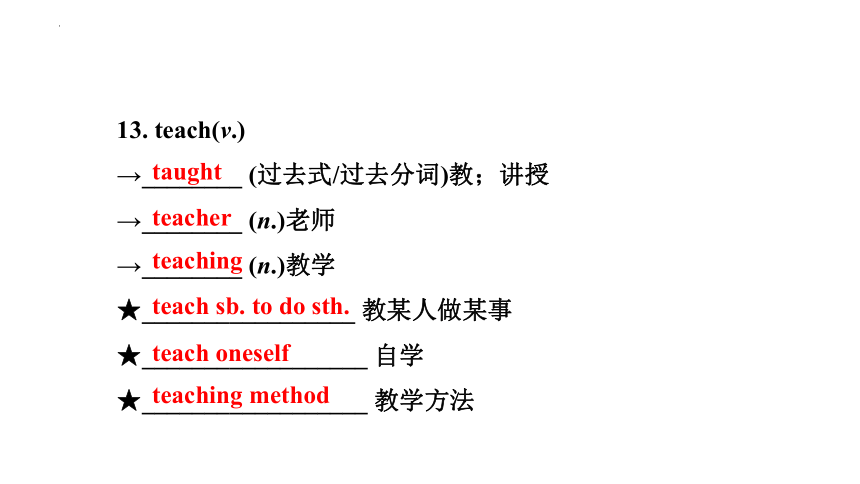
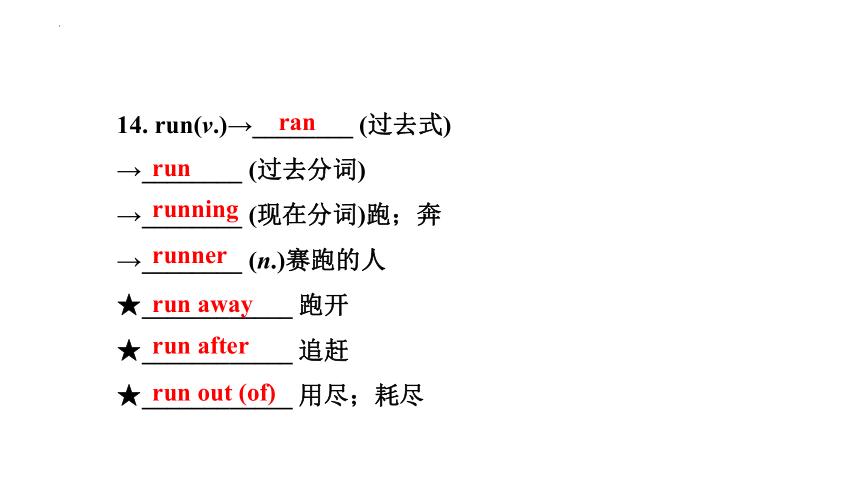
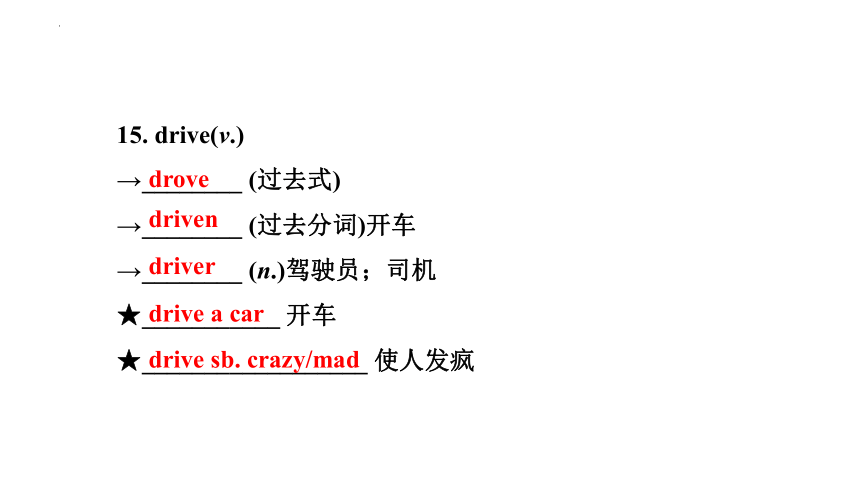
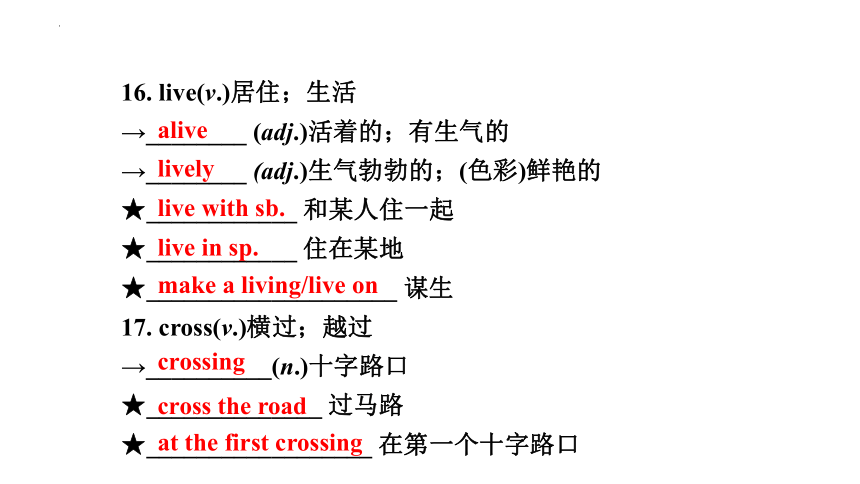
文档简介
(共94张PPT)
Units 1-4复习
名词
1. story(n.)→________ (pl.) 故事;小说
★_______________ 编故事
★__________讲故事
2. center(n.)中心;中央
→________ (adj.)中心的,中央的
★_______________ 在……中心
stories
tell a story
central
make up a story
in the center of
3. tooth(n.)→________ (pl.)牙齿
→_________(n.)牙痛
★________________ 牙痛(短语)
★________________ 刷牙
4. life(n.)→________ (pl.)生活;生命
★________________ 改变某人的生活
★________________ 改善某人的生活
★________________ 救某人的生命
teeth
have a toothache
brush one's teeth
toothache
lives
change one's life
improve one's life
save one's life
5. village(n.)村庄;村镇
→________ (n.)村民
6. luck(n.)幸运;运气
→________ (adj.)幸运的
→________ (adv.)幸运地;好运地
→________ (反义词)不幸的;不吉利的
villager
luckily
unlucky
lucky
动词
7. sing(v.)→________ (过去式)
→________ (过去分词)唱歌
→________ (n.)歌手
8. draw(v.)→________ (过去式)
→________ (过去分词)画
→________ (n.)图画
★_______________画一幅画
sang
sung
singer
drew
drawn
drawing
draw a picture
9. speak(v.)→________ (过去式)
→________ (过去分词)说(某种语言);说话
→________ (n.)讲(某种语言)的人;发言者
★_______________ 对某人说话
★_______________ 说话技巧
10. tell(v.)→________ (过去式/过去分词)讲述;告诉
★____________ 告诉某人某事
★_____________________ 告诉某人(不要)做某事
spoke
spoken
speaker
speak to sb.
speaking skills
told
tell sb. sth.
tell sb. (not)to do sth.
11. write(v.)
→________ (过去式)
→________ (过去分词)写作;写字
→________ (n.)作者;作家
★____________ 写下;记录下
★____________ 给某人写信
wrote
written
writer
write down
write to sb.
12. make(v.)
→________ (过去式/过去分词)使成为;制造
★____________ 确保
★____________ 编造(故事、谎言等)
★________________使某人做某事
★________________ 由……制作(看得出原材料)
★________________ 由……制作(看不出原材料)
★____________ 做菜
made
make sure
make up
make sb. do sth.
be made of
be made from
make dishes
13. teach(v.)
→________ (过去式/过去分词)教;讲授
→________ (n.)老师
→________ (n.)教学
★_________________ 教某人做某事
★__________________ 自学
★__________________ 教学方法
taught
teacher
teaching
teach sb. to do sth.
teach oneself
teaching method
14. run(v.)→________ (过去式)
→________ (过去分词)
→________ (现在分词)跑;奔
→________ (n.)赛跑的人
★____________ 跑开
★____________ 追赶
★____________ 用尽;耗尽
ran
run
running
runner
run away
run after
run out (of)
15. drive(v.)
→________ (过去式)
→________ (过去分词)开车
→________ (n.)驾驶员;司机
★___________ 开车
★__________________ 使人发疯
drove
driven
driver
drive a car
drive sb. crazy/mad
16. live(v.)居住;生活
→________ (adj.)活着的;有生气的
→________ (adj.)生气勃勃的;(色彩)鲜艳的
★____________ 和某人住一起
★____________ 住在某地
★____________________ 谋生
17. cross(v.)横过;越过
→__________(n.)十字路口
★______________ 过马路
★__________________ 在第一个十字路口
alive
lively
live with sb.
live in sp.
make a living/live on
crossing
cross the road
at the first crossing
18. leave(v.)
→________ (过去式/过去分词)离开
★______________ 让某人单独待着
★_________ 前往……
★_________ 忽略;不提及;不包括
★______________ 忘带,留下
★______________ 留一个信息
left
leave sb. alone
leave for
leave out
leave behind
leave a message
19. fight(v.)
→________ (过去式/过去分词)打架;战斗
★____________ 与……作斗争
★____________ 和某人打架
★____________ 为……战斗
20. wear(v.)
→________ (过去式)
→________ (过去分词)穿;戴
★____________ 戴眼镜
fought
fight against
fight with sb.
fight for
wore
worn
wear glasses
21. arrive(v.)
→________ (n.)到达
★____________ 到达(小地点)
★____________ 到达(大地点)
22. bring(v.)
→________ (过去式/过去分词)取来;带来
★______________ 把某物带给某人
★______________________使某人表现出最好的一面
★___________ 抚养
arrival
arrive at
arrive in
brought
bring sth. to sb.
bring out the best in sb.
bring up
23. relax(v.)
→__________ (n.)放松;休息
→__________ (adj.)放松的
→__________ (adj.)令人放松的
24. read(v.)
→________ (过去式/过去分词)读;阅读
→________ (n.)读者
relaxation
relaxed
relaxing
read
reader
25. feel(v.)
→________ (过去式/过去分词)感受;觉得
→________ (n.)感觉;感触
★________ 给……的感觉;想要
★____________ 对……感到抱歉
★_______________________ 满足感
26. follow(v.)遵循;跟随
→__________ (adj.)接着的
→________ (n.)追随者
felt
feeling
feel like
feel sorry for
the feeling of satisfaction
following
follower
27. keep(v.)
→________ (过去式/过去分词)保持;保留
→________ (n.)饲养员;保管人
★_________________ 避免接近;远离
★_________________ 一直做某事
★_________________ 记住某事
★_________________ 与……保持联系
★_____________ 写日记
kept
keeper
keep away from
keep (on)doing sth.
keep sth. in mind
keep in touch with
keep a diary
28. learn(v.)
→______________ (过去式/过去分词)学习;学会
→________ (n.)学习者
★____________ 从/向……学习
★____________ 了解,学习
★______________学着做某事
learned/learnt
learner
learn from...
learn about
learn to do sth.
形容词
29. true(adj.)真的;符合事实的
→________ (adv.)真正地;确实
→________ (adj.)诚实的;真实的
→________ (n.)实情;事实
★_______________ 说实话;老实说
truly
truthful
truth
to tell the truth
30. important(adj.)重要的
→____________ (n.)重要性;重要
★_______________ 对……很重要
★_______________________做某事是重要的
★_______________________ ……的重要性
31. quiet(adj.)安静的
→________ (adv.)轻声地;轻柔地;安静地
★_____________ 保持安静
importance
be important to
it is important to do sth.
the importance of...
quietly
keep/be quiet
32. dirty(adj.)
→________ (比较级)脏的
33. noisy(adj.)吵闹的
→________ (adv.)吵闹地
34. terrible(adj.)非常讨厌的;可怕的
→________ (adv.)非常;可怕地;极度地
35. funny(adj.)
→________ (比较级)
→________ (最高级)奇怪的;滑稽好笑的
dirtier
noisily
terribly
funnier
funniest
兼类词
36. home(n.)家;活动本部
→____________ (adj.)无家可归的
(adv.)到家;在家
★__________ 回家
★_________________ 敬老院
★__________ 在家
homeless
go home
old people's home
at home
37. swim(v.)游泳→________ (过去式)
→________ (过去分词)
→__________ (现在分词)游泳
→__________ (n.)游泳者
(n.)游泳
★______________去游泳
★______________ 游泳池
38. dance(v.)跳舞→________ (n.)舞者
(n.)舞蹈
swam
swum
swimming
swimmer
go swimming
swimming pool
dancer
39. show(v.)
→________ (过去式)
→________ (过去分词)给……看;展示
(n.)演出;节目
★______________ 向某人展示某物
★_________ 赶到;出现
★_________ 炫耀
★_______________带领某人参观
★_________ 展示;演出
showed
shown
show sth. to sb.
show up
show off
show sb. around
on show
40. work(v.)工作→________ (n.)工人
(n.)工作
★__________ 成功地发展;解决
★__________ 致力于……;从事于……
★___________ 失业
41. ride(v.)→________ (过去式)
→________ (过去分词)骑;旅程
(n.)旅程
★_______________ 让某人搭便车
worker
work out
work on
out of work
rode
ridden
give sb. a ride
42. dream(v.& n.)
→__________________(过去式/过去分词)做梦;梦想;睡梦
★________________________________________梦想做某事
★___________________________ =make one's dream come true实现某人的梦想
dreamed/dreamt
dream of/about doing sth.(dream to do sth.)
realize/achieve one's dream
43. clean(v.)打扫;弄干净→________ (n.)清洁工
(adj.)干净的
★_________ 打扫(或清除)干净
★_______________ 打扫某人的房间
★__________ 把……擦掉
★__________ 保持干净
44. taste(v.)有……的味道;品尝
→______ (adj.)好吃的
(n.)味道;滋味
cleaner
clean up
clean one's room
clean...off
keep clean
tasty
45. early(adv.& adj.)早地(的)
→________ (比较级)更早(的)
→________ (最高级)最早(的)
46. far(adv.& adj.)远;远的
→________________ (比较级)更远(的);较远(的)
→________________ (最高级)最远(的);最久(的)
★______________ 远离
★_________ 多远
★_________ 到目前为止;迄今为止
earlier
earliest
farther/further
farthest/furthest
far away from
how far
so far
47. many(adj.& pron.)许多
→______(比较级)更多的(地)
→______(最高级)最多;大多数
more
most
动词短语
1. ____________ 下国际象棋
2. ____________ 说英语
3. ____________ 敲鼓
4. ____________ 弹钢琴
5. ____________ 拉小提琴
6. ____________ 弹吉他
play chess
speak English
play the drum
play the piano
play the violin
play the guitar
7. _______________结交朋友
8. ________________ 在某方面帮助(某人)
9. _________起床;站起
10. ___________穿上衣服
11. ______________洗淋浴
12. ___________________做作业
13. ______________散步;走一走
make friends
help(sb.) with sth.
get up
get dressed
take a shower
do (one's) homework
take a walk
14. _______________ 乘地铁
15. __________ 跟……说
16. _________________ 骑自行车
17. ___________实现;成为现实
18. ___________听……
19. _______外出(娱乐)
20. __________________ 铺床
take the subway
talk to...
ride a bike/by bike
come true
listen to...
go out
make one's/the bed
21. ______________ 遵守规则
22. ____________ 清洗餐具
23. ________ 认为;想起
24. _______ 到达
25. _______________ 刷牙
26. __________ 谈论
follow the rules
do the dishes
think of
get to
brush one's teeth
talk about
27. ____________ 擅长于……
28. ________ 大量;许多
29. ________________ (对某人)要求严格
30. ______________ 对某事严厉
31. ______________ 善于应付……的;对……有办法
be good at...
lots of
be strict(with sb.)
be strict in sth.
be good with ...
形容词短语
32. ____________ 广播电台
33. ____________ 餐厅
34. ____________ 每天
35. ____________ 准时
36. __________________________ (在)周末
37. ____________ 要么……要么……;或者……或者……
38. _______________ 在……和……之间
radio station
dining hall
every day
(be)on time
on weekends/on the weekend
either ... or...
between ... and...
名/副/介/连词短语
1. I'm in the school music club. I______________________________.
我在学校音乐俱乐部。我可以弹吉他和钢琴。
2. He __________________ at eleven o'clock. He's ________ late. 他总是在11点去上班,他从来不迟到。
3. ____________ do you eat breakfast?你什么时间吃早餐?
can play the guitar and the piano
always goes to work
never
What time
4. —________________ your home to school?
从你家到学校有多远?
—It's only about two kilometers. 只有两公里。
5. —__________________ to get home 回家要多久?
—About 15 minutes. 大约15分钟的时间。
6. ______________late for class.You_____________________.
上课不要迟到。你必须按时到。
7. At school, I _______________________________, and I must keep my hair short.在学校,我必须穿校服,并且我必须留短发。
How far is it from
How long does it take
Don't arrive/be
must/have to be on time
have to/must wear a school uniform
8. We need you to help with sports for English speaking students.____________________ !
我们需要你帮助说英语的学生做运动。那是放松和容易的!
9. In the evening, she__________________________________ _________________.
在晚上,她做她的家庭作业,并且通常会游泳或散步。
10. The bus ride _____________________.
乘坐公共汽车大约花费20分钟。
It is relaxing and easy
does her homework and usually swims
or takes a walk
takes about 20 minutes
11. It takes me about 15 minutes to get to school by bike. ________________.
我骑车去学校需要大约15分钟。这是很好的锻炼。
12. It's my first day at school. This is a great school, but_________ ___________.
这是我第一天上学。这是所不错的学校,但是有许多规矩。
13. At school, we have more rules—________________, don't eat in class, ...
在学校,我们有更多的规矩——不能喧哗,上课不能吃东西……
It's good exercise
there are
a lot of rules
don't be noisy
1.draw A.v.画 n.抽签,抽奖 B.v.拉(动) C.v.吸引
①He was constantly on the move, drawing the Danes after him.____
②(2021 重庆 A卷) In my opinion, it’s also a good choice to draw mind maps._____
③The book starts slowly, but it gradually draws you in.____
B
A
C
2.people A.n.人,人们 B. n.民族;种族
①the native peoples of Siberia_____
②(2021 恩施州)There was much rubbish and people lived a hard life. It was a poor and backward little town._______
B
A
3.work A.v.工作;运转 n.工作,劳动 n.(音乐、艺术)作品 B.v.解决
①(2021 湘潭)She has devoted most of her time to her work._____
②Things will work out, you’ll see.______
A
B
4.run A.v.跑;奔 B.v.经营 C.v.流动
①(2021 海南)Jessica ran to next door in a hurry and found Kate lying in the shower with the water still running._____
②(2021 荆州)I want to lose weight. I run five kilometers every day, but it hasn’t worked at all._____
③(2021 温州)These newspapers were run by a group of inexperienced people._____
C
A
B
5.ride A.v.骑(自行车、马等) B.n.供乘骑的游乐设施 C.n.短途旅行
①(2021 贺州)Third, we’d better walk, ride a bike or take the bus when we go out.______
② We took a romantic ride in the cab.____
③(2021 东营)My family and I walked around the amusement park, getting snacks and going on rides._____
A
C
B
6.drive A.v.驾驶,开车 B.v.驱赶;驱使
①(2021 深圳)Some of these chemicals drive insects away._____
②My friend used to drive a car to work, but now he often rides a bike to work.______
B
A
7.rule A.n.规则;规章 B.v.统治
①(2021 十堰)Rivers can differ in size and there is no strict rule on how big a flow of water must be to be called as a river._____
②She once ruled over a vast empire.______
A
B
8.out A.a dv.外出 B. adv.脱离 C. adj.过时的 D. adv.发行
①Children were out playing in the snow._____
②When does her new book come out _____
③Long skirts went out last year.______
④The patient is out of danger.______
A
D
C
B
9.read A.v.读;阅读 B.n.阅读 C.v.理解
①I was having a quiet read when the phone rang.____
②(2021 扬州)When I finished reading,the audience (观众) applauded (鼓掌).________
③Silence must not always be read as consent.______
B
A
C
10.follow A.v.遵循;跟随;仿效;跟得上 B.v.沿着
①If they followed the road, they would be certain to reach a village._______
②(2021 泸州)To get something better, sacrifice (牺牲) is a must. This is a rule that people from all walks of life must follow.________
B
A
11.keep A. v.保留;保持 B. v.养;饲养 C. v.遵守
①(2021 省实验二模)Scientists think that the station can keep working until 2024.After that, scientists will bring it down to Earth.____
②I brought the roses home and tried to find a flower vase to keep them in.______
③She kept her promise to visit them.______
A
B
C
考点1
join “join+组织”意为“加入某个组织、团体、党派”;
“join+sb.”意为“加入某人的行列;和某人一起”;
join in 多 指参加小规模的活动,如球赛、游戏等
attend意为“出席;参加”,主要指“到场”,指参加婚礼、葬礼、典礼等,也可指去上课、上学、听讲座、听报告等
take part in 意为“参加/出席某个活动并在其中起积极作用”
I want to join the art club.(P1)我想加入美术社团。
教材链接
考点1
如:She joined the Party three years ago.
她三年前入党了。
My parents and I attended the wedding.
我和父母参加了那个婚礼。
We often take part in all kinds of activities in school.
我们经常参加学校的各项活动。
I want to join the art club.(P1)我想加入美术社团。
教材链接
考点1
join take part in attend
1.We’re going to visit the flower show tomorrow. Will you ________us
2.How many countries ______________the last Olympic Games
3.He’s going to __________an important speech given by a famous writer in the hall. He wants to improve his speech skills.
4.He __________the army at the age of 18.
I want to join the art club.(P1)我想加入美术社团。
join
took part in
attend
joined
教材链接
考点2
be good at(doing) sth.=do well in (doing) sth.“擅长(做)某事”。
反义词组为 be weak/poor in/at(doing)sth.
be good for “对……有好处”。其反义词组为 be bad for
be good to “对……好”。其同义词组为 be kind/friendly to
be good with “善于应付……的,对……有办法”,后面常接表示人的名词或代词
You’re very good at telling stories.(P2)你很擅长讲故事。
教材链接
考点2
如:Lucy is good at drawing.露西擅长画画。
Eating more fruit is good for your health.
多吃水果对你的健康有好处。
Our English teacher is very good to us.
我们的英语老师对我们很好。
She’s very good with children.她对孩子很有一套。
You’re very good at telling stories.(P2)你很擅长讲故事。
教材链接
考点2
1.(2021 福建)Tai chi is a fun exercise, easy to learn, and you don’t have to be good _______it to enjoy it. (盲填)
2.Eat more fresh fruit, vegetables, fish, eggs and milk. They are good _______your eyes.(盲填)
3.It is good ________relax by exercise.(盲填)
4.(2021 郑外月考)She is good at ________(sing) high-pitched (声调高的) songs.
You’re very good at telling stories.(P2)你很擅长讲故事。
at
for
to
singing
教材链接
考点3
We want students for the school show.(P3)
show sb. sth.=show sth. to sb.
给某人看某物
show
v.
n.
展览 on show展出
给…..看
引;带;领
表示;显露
show up 出现;露面 show off 炫耀
show sb. around/round (sp.) 带某人参观某地
教材链接
考点3
如:Please show me your new pen.= Please show your new pen to me.
请让我看一看你的新钢笔吧。
We organized a talent show to raise money for the people in the flood area.
为了给洪区的人民筹集资金,我们组织了一场才艺秀。
We want students for the school show.(P3)
教材链接
考点3
1.(2021 云南)When I was young,I was very proud. I liked to show_______ in front of others to earn their praise.(盲填)
2.(2021 金华)The results_______ (show)that reading was the most popular activity in the United States, followed by watching TV.
3.—Did you go to the exhibition on May 18th
—Of course.There were many kinds of Taiwan fruits ______show.(盲填)
4.Miss Liu was so nice to show me _______the school when I came here on the first day.(盲填)
We want students for the school show.(P3)
off
showed
on
around
教材链接
考点4
speak 指说话的能力,后常接语言
speak to… 和……说话; speak English 讲英语
tell 侧重指“告诉”,常与lie, story 等搭配,可带双宾语
tell a lie 撒谎;tell sb.(about) sth. 告诉某人(关于)某事;
tell sb.(not)to do sth. 告诉某人(不要)做某事
I can speak English and I can also play soccer.(P5)
教材链接
考点4
talk 强调与某人交谈
talk to/with sb.和某人谈话;
talk about sb./sth.谈论某人/某事
say 强调说话的内容
say thanks/sorry/goodbye to sb. 向某人说谢谢/抱歉/再见
I can speak English and I can also play soccer.(P5)
教材链接
考点4
如:May I speak to John, please 我能和约翰讲话吗
His mother often tells stories to him.
他妈妈经常给他讲故事。
Mr.Chen wants to talk to you.陈老师想和你谈谈。
He said he would come to join us.
他说他会来加入我们。
I can speak English and I can also play soccer.(P5)
教材链接
考点4
1.Though we are in different schools now, we can still talk______ each other by WeChat.(盲填)
speak tell talk say
2.(2021 黄冈)Eric, you _________to go to the teachers’ office just now. What’s up
3.Yesterday an American girl Alice _________Chinese very well. It was amazing.
4.People who can’t speak or hear can__________ by using sign language.
5.(2021 宜宾)Time flies! It won’t be long before we ______goodbye to our beloved school!
I can speak English and I can also play soccer.(P5)
with
were told
spoke
talk
say
教材链接
考点5
dress 表示“穿”的动作或状态,宾语为“人”,意为“给某人穿衣”。
get dressed=dress oneself,意为“给(自己)穿上衣服”。dress up 意为“装扮;乔装打扮”
put on 强调“穿”的动作,后接服装、鞋帽等。当宾语为代词时,需将宾 语放在 put 和 on 之间
wear 强调“穿”的状态,后接服装、鞋帽、眼镜,还可接头发、胡须等
be in 表示“穿、戴”的状态,其后可跟衣服或颜色类的词汇
What time do they get dressed (P9)
教材链接
考点5
如:Please dress the children right now.
请立即给孩子们穿上衣服。
I liked dressing up when I was young.
我年轻的时候喜欢打扮。
You’d better put on your shoes.你最好穿上你的鞋子。
The girl is wearing a red skirt. 那女孩穿着一条红色的短裙。
John is in white today.约翰今天穿着白色的衣服。
What time do they get dressed (P9)
教材链接
考点5
1.The girl who is ______a pink dress is the first of the Senior Entrance Exam of our city.(盲填)
dress put on wear she
2.(2021 苏州改编)According to the new traffic rules, people must ________a helmet when riding an e-bike.
3.(2021 恩施州)It’s cold outside. You’d better _______your coat when you go out.
4.With this in mind, the king _________up and went out into the streets.
5.My daughter is five years old. She is old enough to dress________ every day.
What time do they get dressed (P9)
in
wear
put on
dressed
herself
教材链接
考点6
either 作副词,用于否定句句末,意为“也不”;作代词,意为“(两者中)任一”;作连词,常用于短语 either…or…意为“或者……或者……”,遵循“就近原则”。
如:My brother doesn’t like staying at home alone. I don’t like that, either.
我弟弟不喜欢单独待在家里,我也不喜欢。
Now, all the rivers and lakes are either dry or polluted.
现在,所有的河流和湖泊要么是干涸,要么受到污染。
In the evening, I either watch TV or play computer games.
教材链接
考点6
【拓展】 辨析 either/also/too/as well
either 用于否定句句末,其前用逗号隔开
also 用于肯定句中,be/助/情态动词后,行为动词前
too 用于肯定句句末,其前用逗号隔开
as well 用于肯定句句末,其前不用逗号隔开
In the evening, I either watch TV or play computer games.
教材链接
考点6
either also too as well
2.Good learners will keep practicing, and they will _________learn from the mistakes they have made.
3.The parents don’t like staying up late. Their children don’t like it,_________.
4.If you keep on practicing English every day, you will improve your listening and
speaking skills___________
5.(2021 贺州)I buy a present for my mother on Mother’s Day, and I give my
father a present on Father’s Day,__________.
In the evening, I either watch TV or play computer games.
also
either
as well
too
教材链接
考点7
get to get to +地点
arrive arrive in +大地点;arrive at +小地点
reach 直接加地点
如:Uncle Yang arrived in/reached/got to Shanghai yesterday.
杨叔叔昨天到达了上海。
【注意】arrive at/in 和 get to 后接 here, there 或 home 等地点副词时,介词 at, in, to 要省略。
如:When did you arrive/get home 你何时到家的
How does Mary get to school (P13)
教材链接
考点7
1.(2021 重庆改编)What time did you arrive______ the railway station last night (盲填)
get arrive reach
2.(2021 铜仁)It takes a spaceship about eight months to_________ Mars from the earth when the two planets are closest to each other.
3.I’ll _________at around 5:30 next Saturday and bring some traditional Chinese foods.
4.Excuse me, can you tell me how I can________ to a nearby restaurant
How does Mary get to school (P13)
at
reach
arrive
get
教材链接
考点8
But he is not afraid because he loves school.(P17)
害怕
be afraid of (doing) sth. 害怕某物或担心某事发生
be afraid to do sth.害怕/不敢做某事
I’m afraid (that)+从句 恐怕……
I’m afraid so.恐怕如此。
I’m afraid not.恐怕不行。
afraid
教材链接
考点8
如: I’m always afraid of speaking Chinese in public.
我总是害怕在公共场合说中文。
She is shy and afraid to speak to others.
她很害羞,不敢跟别人说话。
I’m afraid that he has to try again.
恐怕他还得再试一次。
But he is not afraid because he loves school.(P17)
教材链接
考点8
—It’ll rain.要下雨了。
—I’m afraid so.恐怕是。
—May I answer the phone here
我能在这儿接个电话吗
—I’m afraid not.恐怕不行。
But he is not afraid because he loves school.(P17)
教材链接
考点8
1.—Are you afraid _______the dark (盲填)
—Oh, yes. I always go to sleep with the light on.
2.(2021 成都)I am not afraid of ________(argue) because the truth becomes clearer with each debate.
3.Don’t be afraid________ (ask) questions if you don’t understand what your teacher says in class.
4.—Can I take a seat here,sir
—______________ . My cousin will be back soon.(情景交际)
But he is not afraid because he loves school.(P17)
of
argument(s)/arguing
to ask
I’m afraid not
教材链接
考点9
Many of the students and villagers never leave the village.
leave +sp. 离开某地
leave for + sp. 动身去某地
leave A for B 离开A地去B 地
leave sb./sth. behind把某人/某物落下
leave sb. alone=leave sb. by oneself让某人独自待着
leave
v.离开;把……留下
n.休假;假期
ask for a day’s leave 请一天假
教材链接
考点9
Many of the students and villagers never leave the village.
如:Next Friday Alice is leaving for London.
下周五爱丽丝要去伦敦了。
Why are you leaving Shanghai for Beijing
你为什么要离开上海去北京
Leave that mad dog alone.别去惹那条疯狗。
He asked for a three-day leave.他请了三天假。
教材链接
考点9
Many of the students and villagers never leave the village.
1.(2021 洛阳一模)Your father told the driver to leave him________ and just call 911.(盲填)
2.Our team will leave ________Beijing on Sunday to take part in the basketball game.(盲填)
3.This morning I went to work in such a hurry that I _______(leave) the key to my office at home.
4.(2021 成都)A large ship broke down in the river, _______(leave)at least 100 big ships unable to pass.
alone
for
left
leaving
教材链接
考点10
bring 意为“带来,拿来”,强调把人或物从别处带到说话处来。
bring sb. sth.把某物带给某人
bring sb./sth. to sp.把某人/某物带到某地
take意为“带走,拿走”,强调把人或物从说话处带到别处
get 意为“去取来,去拿来”,强调有往返的过程
carry 意为“携带,扛,搬运”,没有方向性,但常含有负重的含义
Can we bring music players to school (P20)
教材链接
考点10
如: He brought us some bread.
他给我们带来了一些面包。
I brought some friends to my tree house.我带几个朋友来我的树屋。
Please take the umbrella with you when you go out.
当你出去的时候,请把伞带上。
Quick! Go and get a doctor.快!去请医生来。
Tom carried his heavy box by himself. 汤姆自己搬他的重箱子。
Can we bring music players to school (P20)
教材链接
考点10
bring take get carry
1.—Ann, wait a moment, please. It’s so cold outside. You’d better _____a coat.
—OK, Mum.
2.(2021 恩施州)In China, it’s a traditional custom to ______a gift when you are
invited to someone’s home.
3.(2021 湖州改编)When he came back in, he was ________a beautiful pogo stick (弹簧单高跷).
4.My father has gone ________medicine, so you don’t have to worry.
Can we bring music players to school (P20)
take
bring
carrying
to get
教材链接
考点11
too many 意为“太多的”,后接可数名词的复数形式, 中心词为 many
too many passengers 太多的乘客
too much 意为“太多的”,后接不可数名词,中心词为much
too much work太多的工作
much too 意为“非常,太”,后接形容词或副词,中心 词为 too
much too heavy 太重
There are too many rules! (P23)
教材链接
考点11
too many too much much too
1.I know how busy you are and naturally I wouldn’t take up of your _________time.
2.Most of them were ___________expensive, but at last she found a cheaper one.
3.Some kinds of animals are dying out because_________ trees are cut down in the world.
There are too many rules! (P23)
too much
much too
too many
教材链接
考点12
At school, I have to wear a school uniform, and I must keep my hair short.
keep sb./sth. +adj.使某人/某物保持……
keep sb./sth. doing sth.让某人/某物不断做某事
keep (on) doing sth.持续不断做某事
keep sb./sth. from doing sth.
阻住(防止)某人/某物做某事
keep
实义动词
保持,持续不断
系动词意为“保持”
keep + adj. 保持……
教材链接
考点12
At school, I have to wear a school uniform, and I must keep my hair short.
如:Gina always keeps silent in class.
吉娜在课堂上总是保持沉默。
An apple a day keeps the doctor away.
每天一苹果,医生远离我。
He kept me waiting for half an hour. 他让我等了半个小时。
I hope you will keep from doing anything rash.
我希望你克制自己不去做任何鲁莽的事。
教材链接
考点12
At school, I have to wear a school uniform, and I must keep my hair short.
1.The boy bit his lips to keep ______laughing aloud.(盲填)
2.As we all know, Da Vinci kept_______ (draw)eggs for several years. And finally he made it.
3.Keep on______ (go) and don’t stop.The higher you climb, the further you will see.
from
drawing
going
教材链接
一、盲填
1.Work hard! I believe that your dream will come _______.
2.(2021 武威改编)Jim started to play _______violin when he was five.
3.(2021 青海改编)—Mom, can I have the pink skirt and the white shirt I like them very much.
—Sorry, baby. They cost too much, but you can choose ________the skirt or the shirt.
4.Beverly eats lots of snacks _______meals. That’s why she is often too full to eat anything at mealtime.
5.(2021 滨州改编)—What do you think ________this kind of clay art
—Great! I have never seen a more beautiful one.
true
the
either
between
of
二、语篇填空
Passage 1
Last Saturday, the weather was fine and I was free. So I got up early. I brushed my 1. ________(tooth) and washed my face quickly. I 2. ________(usual) take a shower in the morning. But I didn't do it that day 3. ________ I had no time. I was going out with my friend, Tony. We decided to ride our bikes to see the 4. ________(beauty) sights in our city.
beautiful
because
usually
teeth
Tony is kind and friendly. He enjoys 5. _________(dance) very much. He is one of my 6. ________ (good) friends. We often do something together on weekends. We met at the gate of the radio station at 8:00 am. I 7. ________(arrive) a few minutes earlier than him. We listened 8. _________ a piece of touching news there. Then we took 9. ________ walk in the yard of the television station. We also ate some food in the nearby restaurant at noon. Some delicious food was introduced to me by 10. ________(he). In the afternoon we went to the theater and watched a funny
best
dancing
a
to
arrived
him
Passage 2
Before the age of nine, Matt Moniz enjoyed summer vacation like all kids do. Then his life 1. ________(sudden) changed. Matt's father invited him to join his hill climbing club. At that time, Matt didn't know 2. ________ was going to happen, but he was very interested in it. He was 3. ________(teach) a lot there. And he said afterward that he had the 4. ________(happy) time of his life.
happiest
taught
what
suddenly
After that, there was nothing can stop 5. ________(he)! The next year, he climbed the first, second, 6. _____(three)... mountain. Then, at 7. ________ age of ten, he climbed Argentina's Aconcagua (a height of 6,962 meters). Since then, Matt has climbed more mountains 8._________ his dad. He thought climbing mountains could make him feel 9.________(relax) and forget some unhappy things.
third
him
with
the
relaxed
In 2010, Matt became the youngest person in the world to climb the highest point in all fifty states in the U.S.— in record time. In his life, he often says there must be 10. ________(hundred) of beautiful mountains waiting for him to climb in the future. Have you found your mountains
hundreds
Bye-bye!
Units 1-4复习
名词
1. story(n.)→________ (pl.) 故事;小说
★_______________ 编故事
★__________讲故事
2. center(n.)中心;中央
→________ (adj.)中心的,中央的
★_______________ 在……中心
stories
tell a story
central
make up a story
in the center of
3. tooth(n.)→________ (pl.)牙齿
→_________(n.)牙痛
★________________ 牙痛(短语)
★________________ 刷牙
4. life(n.)→________ (pl.)生活;生命
★________________ 改变某人的生活
★________________ 改善某人的生活
★________________ 救某人的生命
teeth
have a toothache
brush one's teeth
toothache
lives
change one's life
improve one's life
save one's life
5. village(n.)村庄;村镇
→________ (n.)村民
6. luck(n.)幸运;运气
→________ (adj.)幸运的
→________ (adv.)幸运地;好运地
→________ (反义词)不幸的;不吉利的
villager
luckily
unlucky
lucky
动词
7. sing(v.)→________ (过去式)
→________ (过去分词)唱歌
→________ (n.)歌手
8. draw(v.)→________ (过去式)
→________ (过去分词)画
→________ (n.)图画
★_______________画一幅画
sang
sung
singer
drew
drawn
drawing
draw a picture
9. speak(v.)→________ (过去式)
→________ (过去分词)说(某种语言);说话
→________ (n.)讲(某种语言)的人;发言者
★_______________ 对某人说话
★_______________ 说话技巧
10. tell(v.)→________ (过去式/过去分词)讲述;告诉
★____________ 告诉某人某事
★_____________________ 告诉某人(不要)做某事
spoke
spoken
speaker
speak to sb.
speaking skills
told
tell sb. sth.
tell sb. (not)to do sth.
11. write(v.)
→________ (过去式)
→________ (过去分词)写作;写字
→________ (n.)作者;作家
★____________ 写下;记录下
★____________ 给某人写信
wrote
written
writer
write down
write to sb.
12. make(v.)
→________ (过去式/过去分词)使成为;制造
★____________ 确保
★____________ 编造(故事、谎言等)
★________________使某人做某事
★________________ 由……制作(看得出原材料)
★________________ 由……制作(看不出原材料)
★____________ 做菜
made
make sure
make up
make sb. do sth.
be made of
be made from
make dishes
13. teach(v.)
→________ (过去式/过去分词)教;讲授
→________ (n.)老师
→________ (n.)教学
★_________________ 教某人做某事
★__________________ 自学
★__________________ 教学方法
taught
teacher
teaching
teach sb. to do sth.
teach oneself
teaching method
14. run(v.)→________ (过去式)
→________ (过去分词)
→________ (现在分词)跑;奔
→________ (n.)赛跑的人
★____________ 跑开
★____________ 追赶
★____________ 用尽;耗尽
ran
run
running
runner
run away
run after
run out (of)
15. drive(v.)
→________ (过去式)
→________ (过去分词)开车
→________ (n.)驾驶员;司机
★___________ 开车
★__________________ 使人发疯
drove
driven
driver
drive a car
drive sb. crazy/mad
16. live(v.)居住;生活
→________ (adj.)活着的;有生气的
→________ (adj.)生气勃勃的;(色彩)鲜艳的
★____________ 和某人住一起
★____________ 住在某地
★____________________ 谋生
17. cross(v.)横过;越过
→__________(n.)十字路口
★______________ 过马路
★__________________ 在第一个十字路口
alive
lively
live with sb.
live in sp.
make a living/live on
crossing
cross the road
at the first crossing
18. leave(v.)
→________ (过去式/过去分词)离开
★______________ 让某人单独待着
★_________ 前往……
★_________ 忽略;不提及;不包括
★______________ 忘带,留下
★______________ 留一个信息
left
leave sb. alone
leave for
leave out
leave behind
leave a message
19. fight(v.)
→________ (过去式/过去分词)打架;战斗
★____________ 与……作斗争
★____________ 和某人打架
★____________ 为……战斗
20. wear(v.)
→________ (过去式)
→________ (过去分词)穿;戴
★____________ 戴眼镜
fought
fight against
fight with sb.
fight for
wore
worn
wear glasses
21. arrive(v.)
→________ (n.)到达
★____________ 到达(小地点)
★____________ 到达(大地点)
22. bring(v.)
→________ (过去式/过去分词)取来;带来
★______________ 把某物带给某人
★______________________使某人表现出最好的一面
★___________ 抚养
arrival
arrive at
arrive in
brought
bring sth. to sb.
bring out the best in sb.
bring up
23. relax(v.)
→__________ (n.)放松;休息
→__________ (adj.)放松的
→__________ (adj.)令人放松的
24. read(v.)
→________ (过去式/过去分词)读;阅读
→________ (n.)读者
relaxation
relaxed
relaxing
read
reader
25. feel(v.)
→________ (过去式/过去分词)感受;觉得
→________ (n.)感觉;感触
★________ 给……的感觉;想要
★____________ 对……感到抱歉
★_______________________ 满足感
26. follow(v.)遵循;跟随
→__________ (adj.)接着的
→________ (n.)追随者
felt
feeling
feel like
feel sorry for
the feeling of satisfaction
following
follower
27. keep(v.)
→________ (过去式/过去分词)保持;保留
→________ (n.)饲养员;保管人
★_________________ 避免接近;远离
★_________________ 一直做某事
★_________________ 记住某事
★_________________ 与……保持联系
★_____________ 写日记
kept
keeper
keep away from
keep (on)doing sth.
keep sth. in mind
keep in touch with
keep a diary
28. learn(v.)
→______________ (过去式/过去分词)学习;学会
→________ (n.)学习者
★____________ 从/向……学习
★____________ 了解,学习
★______________学着做某事
learned/learnt
learner
learn from...
learn about
learn to do sth.
形容词
29. true(adj.)真的;符合事实的
→________ (adv.)真正地;确实
→________ (adj.)诚实的;真实的
→________ (n.)实情;事实
★_______________ 说实话;老实说
truly
truthful
truth
to tell the truth
30. important(adj.)重要的
→____________ (n.)重要性;重要
★_______________ 对……很重要
★_______________________做某事是重要的
★_______________________ ……的重要性
31. quiet(adj.)安静的
→________ (adv.)轻声地;轻柔地;安静地
★_____________ 保持安静
importance
be important to
it is important to do sth.
the importance of...
quietly
keep/be quiet
32. dirty(adj.)
→________ (比较级)脏的
33. noisy(adj.)吵闹的
→________ (adv.)吵闹地
34. terrible(adj.)非常讨厌的;可怕的
→________ (adv.)非常;可怕地;极度地
35. funny(adj.)
→________ (比较级)
→________ (最高级)奇怪的;滑稽好笑的
dirtier
noisily
terribly
funnier
funniest
兼类词
36. home(n.)家;活动本部
→____________ (adj.)无家可归的
(adv.)到家;在家
★__________ 回家
★_________________ 敬老院
★__________ 在家
homeless
go home
old people's home
at home
37. swim(v.)游泳→________ (过去式)
→________ (过去分词)
→__________ (现在分词)游泳
→__________ (n.)游泳者
(n.)游泳
★______________去游泳
★______________ 游泳池
38. dance(v.)跳舞→________ (n.)舞者
(n.)舞蹈
swam
swum
swimming
swimmer
go swimming
swimming pool
dancer
39. show(v.)
→________ (过去式)
→________ (过去分词)给……看;展示
(n.)演出;节目
★______________ 向某人展示某物
★_________ 赶到;出现
★_________ 炫耀
★_______________带领某人参观
★_________ 展示;演出
showed
shown
show sth. to sb.
show up
show off
show sb. around
on show
40. work(v.)工作→________ (n.)工人
(n.)工作
★__________ 成功地发展;解决
★__________ 致力于……;从事于……
★___________ 失业
41. ride(v.)→________ (过去式)
→________ (过去分词)骑;旅程
(n.)旅程
★_______________ 让某人搭便车
worker
work out
work on
out of work
rode
ridden
give sb. a ride
42. dream(v.& n.)
→__________________(过去式/过去分词)做梦;梦想;睡梦
★________________________________________梦想做某事
★___________________________ =make one's dream come true实现某人的梦想
dreamed/dreamt
dream of/about doing sth.(dream to do sth.)
realize/achieve one's dream
43. clean(v.)打扫;弄干净→________ (n.)清洁工
(adj.)干净的
★_________ 打扫(或清除)干净
★_______________ 打扫某人的房间
★__________ 把……擦掉
★__________ 保持干净
44. taste(v.)有……的味道;品尝
→______ (adj.)好吃的
(n.)味道;滋味
cleaner
clean up
clean one's room
clean...off
keep clean
tasty
45. early(adv.& adj.)早地(的)
→________ (比较级)更早(的)
→________ (最高级)最早(的)
46. far(adv.& adj.)远;远的
→________________ (比较级)更远(的);较远(的)
→________________ (最高级)最远(的);最久(的)
★______________ 远离
★_________ 多远
★_________ 到目前为止;迄今为止
earlier
earliest
farther/further
farthest/furthest
far away from
how far
so far
47. many(adj.& pron.)许多
→______(比较级)更多的(地)
→______(最高级)最多;大多数
more
most
动词短语
1. ____________ 下国际象棋
2. ____________ 说英语
3. ____________ 敲鼓
4. ____________ 弹钢琴
5. ____________ 拉小提琴
6. ____________ 弹吉他
play chess
speak English
play the drum
play the piano
play the violin
play the guitar
7. _______________结交朋友
8. ________________ 在某方面帮助(某人)
9. _________起床;站起
10. ___________穿上衣服
11. ______________洗淋浴
12. ___________________做作业
13. ______________散步;走一走
make friends
help(sb.) with sth.
get up
get dressed
take a shower
do (one's) homework
take a walk
14. _______________ 乘地铁
15. __________ 跟……说
16. _________________ 骑自行车
17. ___________实现;成为现实
18. ___________听……
19. _______外出(娱乐)
20. __________________ 铺床
take the subway
talk to...
ride a bike/by bike
come true
listen to...
go out
make one's/the bed
21. ______________ 遵守规则
22. ____________ 清洗餐具
23. ________ 认为;想起
24. _______ 到达
25. _______________ 刷牙
26. __________ 谈论
follow the rules
do the dishes
think of
get to
brush one's teeth
talk about
27. ____________ 擅长于……
28. ________ 大量;许多
29. ________________ (对某人)要求严格
30. ______________ 对某事严厉
31. ______________ 善于应付……的;对……有办法
be good at...
lots of
be strict(with sb.)
be strict in sth.
be good with ...
形容词短语
32. ____________ 广播电台
33. ____________ 餐厅
34. ____________ 每天
35. ____________ 准时
36. __________________________ (在)周末
37. ____________ 要么……要么……;或者……或者……
38. _______________ 在……和……之间
radio station
dining hall
every day
(be)on time
on weekends/on the weekend
either ... or...
between ... and...
名/副/介/连词短语
1. I'm in the school music club. I______________________________.
我在学校音乐俱乐部。我可以弹吉他和钢琴。
2. He __________________ at eleven o'clock. He's ________ late. 他总是在11点去上班,他从来不迟到。
3. ____________ do you eat breakfast?你什么时间吃早餐?
can play the guitar and the piano
always goes to work
never
What time
4. —________________ your home to school?
从你家到学校有多远?
—It's only about two kilometers. 只有两公里。
5. —__________________ to get home 回家要多久?
—About 15 minutes. 大约15分钟的时间。
6. ______________late for class.You_____________________.
上课不要迟到。你必须按时到。
7. At school, I _______________________________, and I must keep my hair short.在学校,我必须穿校服,并且我必须留短发。
How far is it from
How long does it take
Don't arrive/be
must/have to be on time
have to/must wear a school uniform
8. We need you to help with sports for English speaking students.____________________ !
我们需要你帮助说英语的学生做运动。那是放松和容易的!
9. In the evening, she__________________________________ _________________.
在晚上,她做她的家庭作业,并且通常会游泳或散步。
10. The bus ride _____________________.
乘坐公共汽车大约花费20分钟。
It is relaxing and easy
does her homework and usually swims
or takes a walk
takes about 20 minutes
11. It takes me about 15 minutes to get to school by bike. ________________.
我骑车去学校需要大约15分钟。这是很好的锻炼。
12. It's my first day at school. This is a great school, but_________ ___________.
这是我第一天上学。这是所不错的学校,但是有许多规矩。
13. At school, we have more rules—________________, don't eat in class, ...
在学校,我们有更多的规矩——不能喧哗,上课不能吃东西……
It's good exercise
there are
a lot of rules
don't be noisy
1.draw A.v.画 n.抽签,抽奖 B.v.拉(动) C.v.吸引
①He was constantly on the move, drawing the Danes after him.____
②(2021 重庆 A卷) In my opinion, it’s also a good choice to draw mind maps._____
③The book starts slowly, but it gradually draws you in.____
B
A
C
2.people A.n.人,人们 B. n.民族;种族
①the native peoples of Siberia_____
②(2021 恩施州)There was much rubbish and people lived a hard life. It was a poor and backward little town._______
B
A
3.work A.v.工作;运转 n.工作,劳动 n.(音乐、艺术)作品 B.v.解决
①(2021 湘潭)She has devoted most of her time to her work._____
②Things will work out, you’ll see.______
A
B
4.run A.v.跑;奔 B.v.经营 C.v.流动
①(2021 海南)Jessica ran to next door in a hurry and found Kate lying in the shower with the water still running._____
②(2021 荆州)I want to lose weight. I run five kilometers every day, but it hasn’t worked at all._____
③(2021 温州)These newspapers were run by a group of inexperienced people._____
C
A
B
5.ride A.v.骑(自行车、马等) B.n.供乘骑的游乐设施 C.n.短途旅行
①(2021 贺州)Third, we’d better walk, ride a bike or take the bus when we go out.______
② We took a romantic ride in the cab.____
③(2021 东营)My family and I walked around the amusement park, getting snacks and going on rides._____
A
C
B
6.drive A.v.驾驶,开车 B.v.驱赶;驱使
①(2021 深圳)Some of these chemicals drive insects away._____
②My friend used to drive a car to work, but now he often rides a bike to work.______
B
A
7.rule A.n.规则;规章 B.v.统治
①(2021 十堰)Rivers can differ in size and there is no strict rule on how big a flow of water must be to be called as a river._____
②She once ruled over a vast empire.______
A
B
8.out A.a dv.外出 B. adv.脱离 C. adj.过时的 D. adv.发行
①Children were out playing in the snow._____
②When does her new book come out _____
③Long skirts went out last year.______
④The patient is out of danger.______
A
D
C
B
9.read A.v.读;阅读 B.n.阅读 C.v.理解
①I was having a quiet read when the phone rang.____
②(2021 扬州)When I finished reading,the audience (观众) applauded (鼓掌).________
③Silence must not always be read as consent.______
B
A
C
10.follow A.v.遵循;跟随;仿效;跟得上 B.v.沿着
①If they followed the road, they would be certain to reach a village._______
②(2021 泸州)To get something better, sacrifice (牺牲) is a must. This is a rule that people from all walks of life must follow.________
B
A
11.keep A. v.保留;保持 B. v.养;饲养 C. v.遵守
①(2021 省实验二模)Scientists think that the station can keep working until 2024.After that, scientists will bring it down to Earth.____
②I brought the roses home and tried to find a flower vase to keep them in.______
③She kept her promise to visit them.______
A
B
C
考点1
join “join+组织”意为“加入某个组织、团体、党派”;
“join+sb.”意为“加入某人的行列;和某人一起”;
join in 多 指参加小规模的活动,如球赛、游戏等
attend意为“出席;参加”,主要指“到场”,指参加婚礼、葬礼、典礼等,也可指去上课、上学、听讲座、听报告等
take part in 意为“参加/出席某个活动并在其中起积极作用”
I want to join the art club.(P1)我想加入美术社团。
教材链接
考点1
如:She joined the Party three years ago.
她三年前入党了。
My parents and I attended the wedding.
我和父母参加了那个婚礼。
We often take part in all kinds of activities in school.
我们经常参加学校的各项活动。
I want to join the art club.(P1)我想加入美术社团。
教材链接
考点1
join take part in attend
1.We’re going to visit the flower show tomorrow. Will you ________us
2.How many countries ______________the last Olympic Games
3.He’s going to __________an important speech given by a famous writer in the hall. He wants to improve his speech skills.
4.He __________the army at the age of 18.
I want to join the art club.(P1)我想加入美术社团。
join
took part in
attend
joined
教材链接
考点2
be good at(doing) sth.=do well in (doing) sth.“擅长(做)某事”。
反义词组为 be weak/poor in/at(doing)sth.
be good for “对……有好处”。其反义词组为 be bad for
be good to “对……好”。其同义词组为 be kind/friendly to
be good with “善于应付……的,对……有办法”,后面常接表示人的名词或代词
You’re very good at telling stories.(P2)你很擅长讲故事。
教材链接
考点2
如:Lucy is good at drawing.露西擅长画画。
Eating more fruit is good for your health.
多吃水果对你的健康有好处。
Our English teacher is very good to us.
我们的英语老师对我们很好。
She’s very good with children.她对孩子很有一套。
You’re very good at telling stories.(P2)你很擅长讲故事。
教材链接
考点2
1.(2021 福建)Tai chi is a fun exercise, easy to learn, and you don’t have to be good _______it to enjoy it. (盲填)
2.Eat more fresh fruit, vegetables, fish, eggs and milk. They are good _______your eyes.(盲填)
3.It is good ________relax by exercise.(盲填)
4.(2021 郑外月考)She is good at ________(sing) high-pitched (声调高的) songs.
You’re very good at telling stories.(P2)你很擅长讲故事。
at
for
to
singing
教材链接
考点3
We want students for the school show.(P3)
show sb. sth.=show sth. to sb.
给某人看某物
show
v.
n.
展览 on show展出
给…..看
引;带;领
表示;显露
show up 出现;露面 show off 炫耀
show sb. around/round (sp.) 带某人参观某地
教材链接
考点3
如:Please show me your new pen.= Please show your new pen to me.
请让我看一看你的新钢笔吧。
We organized a talent show to raise money for the people in the flood area.
为了给洪区的人民筹集资金,我们组织了一场才艺秀。
We want students for the school show.(P3)
教材链接
考点3
1.(2021 云南)When I was young,I was very proud. I liked to show_______ in front of others to earn their praise.(盲填)
2.(2021 金华)The results_______ (show)that reading was the most popular activity in the United States, followed by watching TV.
3.—Did you go to the exhibition on May 18th
—Of course.There were many kinds of Taiwan fruits ______show.(盲填)
4.Miss Liu was so nice to show me _______the school when I came here on the first day.(盲填)
We want students for the school show.(P3)
off
showed
on
around
教材链接
考点4
speak 指说话的能力,后常接语言
speak to… 和……说话; speak English 讲英语
tell 侧重指“告诉”,常与lie, story 等搭配,可带双宾语
tell a lie 撒谎;tell sb.(about) sth. 告诉某人(关于)某事;
tell sb.(not)to do sth. 告诉某人(不要)做某事
I can speak English and I can also play soccer.(P5)
教材链接
考点4
talk 强调与某人交谈
talk to/with sb.和某人谈话;
talk about sb./sth.谈论某人/某事
say 强调说话的内容
say thanks/sorry/goodbye to sb. 向某人说谢谢/抱歉/再见
I can speak English and I can also play soccer.(P5)
教材链接
考点4
如:May I speak to John, please 我能和约翰讲话吗
His mother often tells stories to him.
他妈妈经常给他讲故事。
Mr.Chen wants to talk to you.陈老师想和你谈谈。
He said he would come to join us.
他说他会来加入我们。
I can speak English and I can also play soccer.(P5)
教材链接
考点4
1.Though we are in different schools now, we can still talk______ each other by WeChat.(盲填)
speak tell talk say
2.(2021 黄冈)Eric, you _________to go to the teachers’ office just now. What’s up
3.Yesterday an American girl Alice _________Chinese very well. It was amazing.
4.People who can’t speak or hear can__________ by using sign language.
5.(2021 宜宾)Time flies! It won’t be long before we ______goodbye to our beloved school!
I can speak English and I can also play soccer.(P5)
with
were told
spoke
talk
say
教材链接
考点5
dress 表示“穿”的动作或状态,宾语为“人”,意为“给某人穿衣”。
get dressed=dress oneself,意为“给(自己)穿上衣服”。dress up 意为“装扮;乔装打扮”
put on 强调“穿”的动作,后接服装、鞋帽等。当宾语为代词时,需将宾 语放在 put 和 on 之间
wear 强调“穿”的状态,后接服装、鞋帽、眼镜,还可接头发、胡须等
be in 表示“穿、戴”的状态,其后可跟衣服或颜色类的词汇
What time do they get dressed (P9)
教材链接
考点5
如:Please dress the children right now.
请立即给孩子们穿上衣服。
I liked dressing up when I was young.
我年轻的时候喜欢打扮。
You’d better put on your shoes.你最好穿上你的鞋子。
The girl is wearing a red skirt. 那女孩穿着一条红色的短裙。
John is in white today.约翰今天穿着白色的衣服。
What time do they get dressed (P9)
教材链接
考点5
1.The girl who is ______a pink dress is the first of the Senior Entrance Exam of our city.(盲填)
dress put on wear she
2.(2021 苏州改编)According to the new traffic rules, people must ________a helmet when riding an e-bike.
3.(2021 恩施州)It’s cold outside. You’d better _______your coat when you go out.
4.With this in mind, the king _________up and went out into the streets.
5.My daughter is five years old. She is old enough to dress________ every day.
What time do they get dressed (P9)
in
wear
put on
dressed
herself
教材链接
考点6
either 作副词,用于否定句句末,意为“也不”;作代词,意为“(两者中)任一”;作连词,常用于短语 either…or…意为“或者……或者……”,遵循“就近原则”。
如:My brother doesn’t like staying at home alone. I don’t like that, either.
我弟弟不喜欢单独待在家里,我也不喜欢。
Now, all the rivers and lakes are either dry or polluted.
现在,所有的河流和湖泊要么是干涸,要么受到污染。
In the evening, I either watch TV or play computer games.
教材链接
考点6
【拓展】 辨析 either/also/too/as well
either 用于否定句句末,其前用逗号隔开
also 用于肯定句中,be/助/情态动词后,行为动词前
too 用于肯定句句末,其前用逗号隔开
as well 用于肯定句句末,其前不用逗号隔开
In the evening, I either watch TV or play computer games.
教材链接
考点6
either also too as well
2.Good learners will keep practicing, and they will _________learn from the mistakes they have made.
3.The parents don’t like staying up late. Their children don’t like it,_________.
4.If you keep on practicing English every day, you will improve your listening and
speaking skills___________
5.(2021 贺州)I buy a present for my mother on Mother’s Day, and I give my
father a present on Father’s Day,__________.
In the evening, I either watch TV or play computer games.
also
either
as well
too
教材链接
考点7
get to get to +地点
arrive arrive in +大地点;arrive at +小地点
reach 直接加地点
如:Uncle Yang arrived in/reached/got to Shanghai yesterday.
杨叔叔昨天到达了上海。
【注意】arrive at/in 和 get to 后接 here, there 或 home 等地点副词时,介词 at, in, to 要省略。
如:When did you arrive/get home 你何时到家的
How does Mary get to school (P13)
教材链接
考点7
1.(2021 重庆改编)What time did you arrive______ the railway station last night (盲填)
get arrive reach
2.(2021 铜仁)It takes a spaceship about eight months to_________ Mars from the earth when the two planets are closest to each other.
3.I’ll _________at around 5:30 next Saturday and bring some traditional Chinese foods.
4.Excuse me, can you tell me how I can________ to a nearby restaurant
How does Mary get to school (P13)
at
reach
arrive
get
教材链接
考点8
But he is not afraid because he loves school.(P17)
害怕
be afraid of (doing) sth. 害怕某物或担心某事发生
be afraid to do sth.害怕/不敢做某事
I’m afraid (that)+从句 恐怕……
I’m afraid so.恐怕如此。
I’m afraid not.恐怕不行。
afraid
教材链接
考点8
如: I’m always afraid of speaking Chinese in public.
我总是害怕在公共场合说中文。
She is shy and afraid to speak to others.
她很害羞,不敢跟别人说话。
I’m afraid that he has to try again.
恐怕他还得再试一次。
But he is not afraid because he loves school.(P17)
教材链接
考点8
—It’ll rain.要下雨了。
—I’m afraid so.恐怕是。
—May I answer the phone here
我能在这儿接个电话吗
—I’m afraid not.恐怕不行。
But he is not afraid because he loves school.(P17)
教材链接
考点8
1.—Are you afraid _______the dark (盲填)
—Oh, yes. I always go to sleep with the light on.
2.(2021 成都)I am not afraid of ________(argue) because the truth becomes clearer with each debate.
3.Don’t be afraid________ (ask) questions if you don’t understand what your teacher says in class.
4.—Can I take a seat here,sir
—______________ . My cousin will be back soon.(情景交际)
But he is not afraid because he loves school.(P17)
of
argument(s)/arguing
to ask
I’m afraid not
教材链接
考点9
Many of the students and villagers never leave the village.
leave +sp. 离开某地
leave for + sp. 动身去某地
leave A for B 离开A地去B 地
leave sb./sth. behind把某人/某物落下
leave sb. alone=leave sb. by oneself让某人独自待着
leave
v.离开;把……留下
n.休假;假期
ask for a day’s leave 请一天假
教材链接
考点9
Many of the students and villagers never leave the village.
如:Next Friday Alice is leaving for London.
下周五爱丽丝要去伦敦了。
Why are you leaving Shanghai for Beijing
你为什么要离开上海去北京
Leave that mad dog alone.别去惹那条疯狗。
He asked for a three-day leave.他请了三天假。
教材链接
考点9
Many of the students and villagers never leave the village.
1.(2021 洛阳一模)Your father told the driver to leave him________ and just call 911.(盲填)
2.Our team will leave ________Beijing on Sunday to take part in the basketball game.(盲填)
3.This morning I went to work in such a hurry that I _______(leave) the key to my office at home.
4.(2021 成都)A large ship broke down in the river, _______(leave)at least 100 big ships unable to pass.
alone
for
left
leaving
教材链接
考点10
bring 意为“带来,拿来”,强调把人或物从别处带到说话处来。
bring sb. sth.把某物带给某人
bring sb./sth. to sp.把某人/某物带到某地
take意为“带走,拿走”,强调把人或物从说话处带到别处
get 意为“去取来,去拿来”,强调有往返的过程
carry 意为“携带,扛,搬运”,没有方向性,但常含有负重的含义
Can we bring music players to school (P20)
教材链接
考点10
如: He brought us some bread.
他给我们带来了一些面包。
I brought some friends to my tree house.我带几个朋友来我的树屋。
Please take the umbrella with you when you go out.
当你出去的时候,请把伞带上。
Quick! Go and get a doctor.快!去请医生来。
Tom carried his heavy box by himself. 汤姆自己搬他的重箱子。
Can we bring music players to school (P20)
教材链接
考点10
bring take get carry
1.—Ann, wait a moment, please. It’s so cold outside. You’d better _____a coat.
—OK, Mum.
2.(2021 恩施州)In China, it’s a traditional custom to ______a gift when you are
invited to someone’s home.
3.(2021 湖州改编)When he came back in, he was ________a beautiful pogo stick (弹簧单高跷).
4.My father has gone ________medicine, so you don’t have to worry.
Can we bring music players to school (P20)
take
bring
carrying
to get
教材链接
考点11
too many 意为“太多的”,后接可数名词的复数形式, 中心词为 many
too many passengers 太多的乘客
too much 意为“太多的”,后接不可数名词,中心词为much
too much work太多的工作
much too 意为“非常,太”,后接形容词或副词,中心 词为 too
much too heavy 太重
There are too many rules! (P23)
教材链接
考点11
too many too much much too
1.I know how busy you are and naturally I wouldn’t take up of your _________time.
2.Most of them were ___________expensive, but at last she found a cheaper one.
3.Some kinds of animals are dying out because_________ trees are cut down in the world.
There are too many rules! (P23)
too much
much too
too many
教材链接
考点12
At school, I have to wear a school uniform, and I must keep my hair short.
keep sb./sth. +adj.使某人/某物保持……
keep sb./sth. doing sth.让某人/某物不断做某事
keep (on) doing sth.持续不断做某事
keep sb./sth. from doing sth.
阻住(防止)某人/某物做某事
keep
实义动词
保持,持续不断
系动词意为“保持”
keep + adj. 保持……
教材链接
考点12
At school, I have to wear a school uniform, and I must keep my hair short.
如:Gina always keeps silent in class.
吉娜在课堂上总是保持沉默。
An apple a day keeps the doctor away.
每天一苹果,医生远离我。
He kept me waiting for half an hour. 他让我等了半个小时。
I hope you will keep from doing anything rash.
我希望你克制自己不去做任何鲁莽的事。
教材链接
考点12
At school, I have to wear a school uniform, and I must keep my hair short.
1.The boy bit his lips to keep ______laughing aloud.(盲填)
2.As we all know, Da Vinci kept_______ (draw)eggs for several years. And finally he made it.
3.Keep on______ (go) and don’t stop.The higher you climb, the further you will see.
from
drawing
going
教材链接
一、盲填
1.Work hard! I believe that your dream will come _______.
2.(2021 武威改编)Jim started to play _______violin when he was five.
3.(2021 青海改编)—Mom, can I have the pink skirt and the white shirt I like them very much.
—Sorry, baby. They cost too much, but you can choose ________the skirt or the shirt.
4.Beverly eats lots of snacks _______meals. That’s why she is often too full to eat anything at mealtime.
5.(2021 滨州改编)—What do you think ________this kind of clay art
—Great! I have never seen a more beautiful one.
true
the
either
between
of
二、语篇填空
Passage 1
Last Saturday, the weather was fine and I was free. So I got up early. I brushed my 1. ________(tooth) and washed my face quickly. I 2. ________(usual) take a shower in the morning. But I didn't do it that day 3. ________ I had no time. I was going out with my friend, Tony. We decided to ride our bikes to see the 4. ________(beauty) sights in our city.
beautiful
because
usually
teeth
Tony is kind and friendly. He enjoys 5. _________(dance) very much. He is one of my 6. ________ (good) friends. We often do something together on weekends. We met at the gate of the radio station at 8:00 am. I 7. ________(arrive) a few minutes earlier than him. We listened 8. _________ a piece of touching news there. Then we took 9. ________ walk in the yard of the television station. We also ate some food in the nearby restaurant at noon. Some delicious food was introduced to me by 10. ________(he). In the afternoon we went to the theater and watched a funny
best
dancing
a
to
arrived
him
Passage 2
Before the age of nine, Matt Moniz enjoyed summer vacation like all kids do. Then his life 1. ________(sudden) changed. Matt's father invited him to join his hill climbing club. At that time, Matt didn't know 2. ________ was going to happen, but he was very interested in it. He was 3. ________(teach) a lot there. And he said afterward that he had the 4. ________(happy) time of his life.
happiest
taught
what
suddenly
After that, there was nothing can stop 5. ________(he)! The next year, he climbed the first, second, 6. _____(three)... mountain. Then, at 7. ________ age of ten, he climbed Argentina's Aconcagua (a height of 6,962 meters). Since then, Matt has climbed more mountains 8._________ his dad. He thought climbing mountains could make him feel 9.________(relax) and forget some unhappy things.
third
him
with
the
relaxed
In 2010, Matt became the youngest person in the world to climb the highest point in all fifty states in the U.S.— in record time. In his life, he often says there must be 10. ________(hundred) of beautiful mountains waiting for him to climb in the future. Have you found your mountains
hundreds
Bye-bye!
同课章节目录
- Unit 1 Can you play the guitar?
- Section A
- Section B
- Unit 2 What time do you go to school?
- Section A
- Section B
- Unit 3 How do you get to school?
- Section A
- Section B
- Unit 4 Don't eat in class.
- Section A
- Section B
- Unit 5 Why do you like pandas?
- Section A
- Section B
- Unit 6 I'm watching TV.
- Section A
- Section B
- Review of Units 1-6
- Unit 7 It's raining!
- Section A
- Section B
- Unit 8 Is there a post office near here?
- Section A
- Section B
- Unit 9 What does he look like?
- Section A
- Section B
- Unit 10 I'd like some noodles.
- Section A
- Section B
- Unit 11 How was your school trip?
- Section A
- Section B
- Unit 12 What did you do last weekend?
- Section A
- Section B
